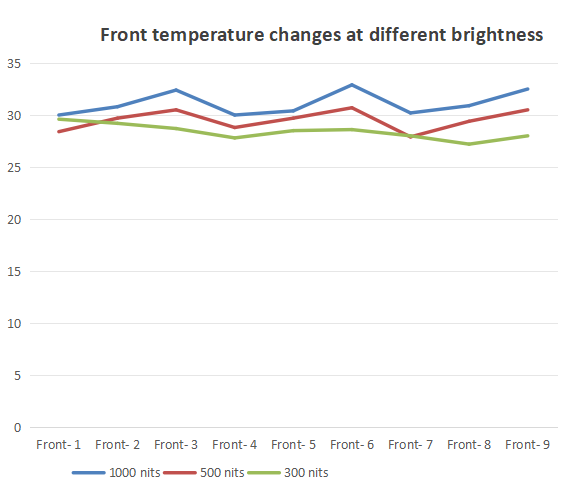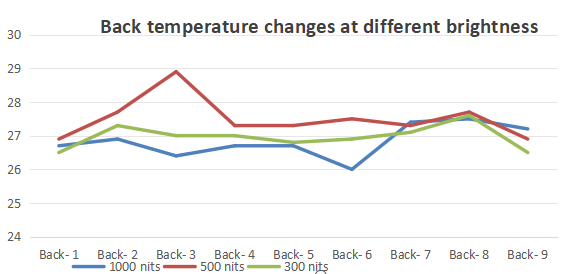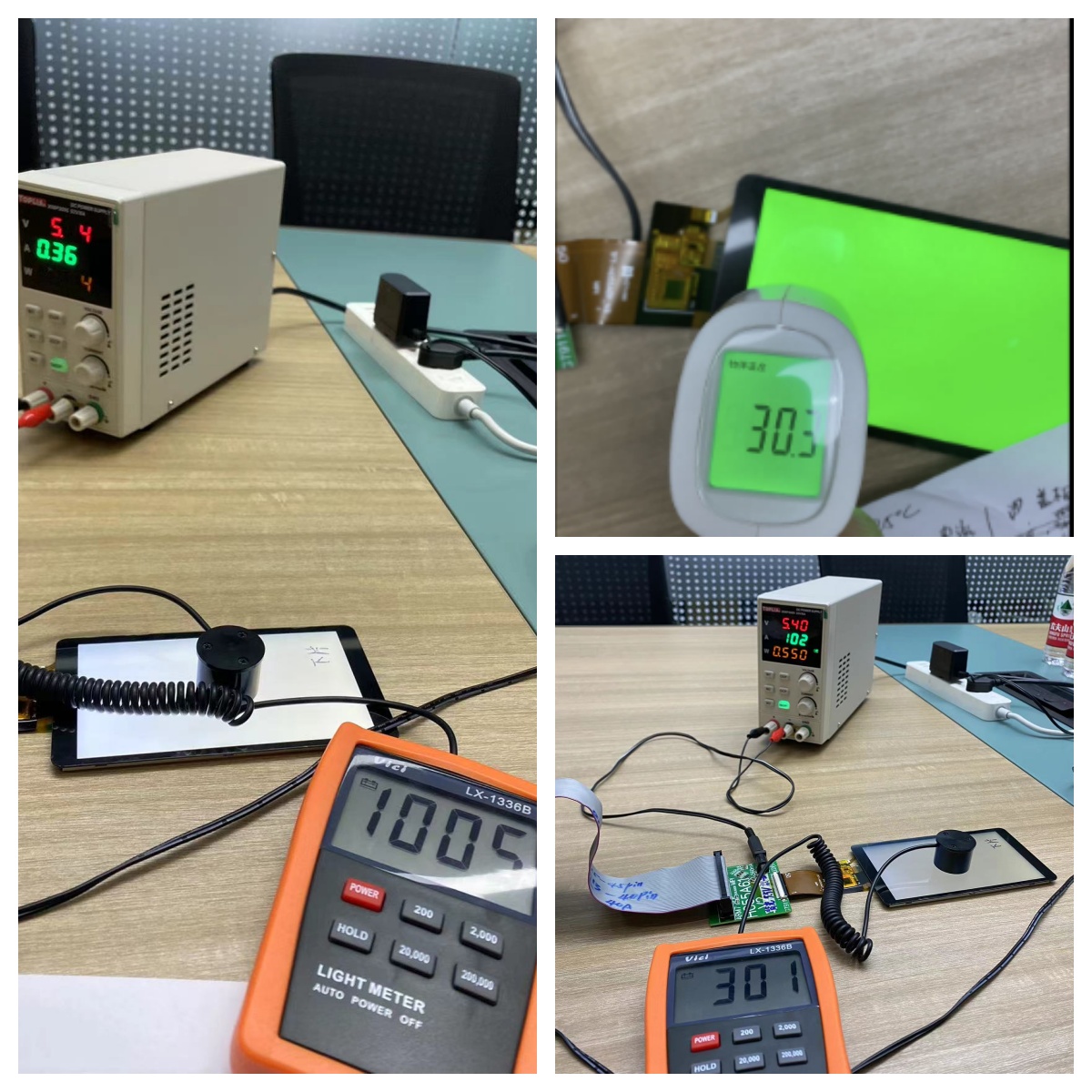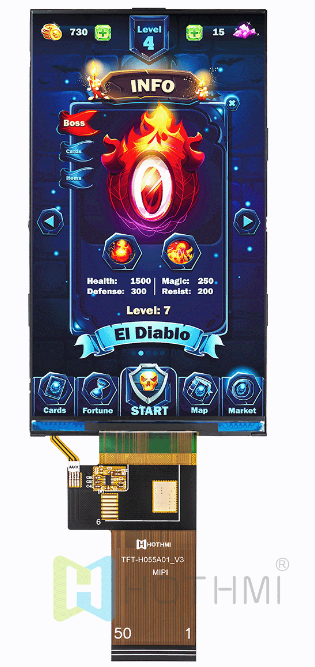Experiment on the changing law of the influence of display brightness on the display temperature
1. Experimental objectives:
Explore the impact of different brightness on display temperature under the same working hours.
2. Experimental methods:
Constant ambient temperature is 25°C.
Variable: The brightness is set in three levels: 1000nit, 500nit, and 300nit.
Dependent variables: voltage and current of the display screen, and surface temperature of objects at different positions on the front and back of the display scree
Experimental instruments: brightness detector, adjustable constant voltage & current meter, infrared object surface detector, display screen, and related supporting accessories.
3. Experimental process:
Experimental environment: closed, dry, clean space with room temperature of 25°C.
Hot Display product model:TFT-H055A61HDINVKN40As an experimental object, the display screen was adjusted to a white picture, because white is the standard color for detecting brightness.
Adjust the current to control the brightness to 1000nit, 500nit, and 300nit. After each brightness condition is adjusted correctly, read the corresponding voltage and current values.
Keep the display working for 20 minutes at each different brightness condition, measure the nine-square position on the front and back of the display (see Figure 1 below for detailed position markings), and record the temperature closest to the backlight source. Wait for 10 minutes to ensure that the display returns to room temperature before lighting the display and adjusting to the next brightness. And so on until all three brightnesses are tested.
Summarize the experimental results and find out the law of changes in the influence of display brightness on the display temperature itself.

(Figure 1)
4. Experimental results.
Data source.
(1)TFT-H055A61HDINVKN40The voltage and current values corresponding to different brightness levels can be used as a reference for the power consumption of the product.
Brightness(nits) | Voltage(V) | Current(mA) |
1000 | 5.84 | 367 |
500 | 5.55 | 180 |
300 | 5.4 | 102 |
(2)TFT-H055A61HDINVKN40Different brightness temperature change data sources.
Panel temperature distribution(°C) | |||
Location | 1000 nits | 500 nits | 300 nits |
Front - Highest | 34.3 | 32.4 | 29.6 |
Front -- 1 | 30 | 28.4 | 29.6 |
Front -- 2 | 30.8 | 29.7 | 29.2 |
Front -- 3 | 32.4 | 30.5 | 28.7 |
Front -- 4 | 30 | 28.8 | 27.8 |
Front -- 5 | 30.4 | 29.7 | 28.5 |
Front -- 6 | 32.9 | 30.7 | 28.6 |
Front -- 7 | 30.2 | 27.9 | 28 |
Front -- 8 | 30.9 | 29.4 | 27.2 |
Front -- 9 | 32.5 | 30.5 | 28 |
Back- 1 | 26.7 | 26.9 | 26.5 |
Back- 2 | 26.9 | 27.7 | 27.3 |
Back- 3 | 26.4 | 28.9 | 27 |
Back- 4 | 26.7 | 27.3 | 27 |
Back- 5 | 26.7 | 27.3 | 26.8 |
Back- 6 | 26 | 27.5 | 26.9 |
Back- 7 | 27.4 | 27.3 | 27.1 |
Back- 8 | 27.5 | 27.7 | 27.6 |
Back- 9 | 27.2 | 26.9 | 26.5 |
(3) Changes in different positions on the front of the display screen at different brightness: Table (1)。

(Table1)
(4)Changes in different positions on the front of the display screen at different brightness: Table (2)

(Table2)
5. Experimental conclusion:
As shown in Table 1, the surface temperature of objects on the front of the display screen will increase with the increase of brightness. Table 2 shows that there is no regular pattern to follow in the effect of brightness on the temperature of the back of the display screen.
As shown in Table 1, the closer to the backlight source, the higher the temperature of the front of the display screen, and the temperature will continue to drop when the backlight source is not in use.
As shown in Table 2, the temperature at different positions on the back of the display screen does not change with whether it is close to the backlight source, and the temperature is basically maintained at room temperature and will not be too high.
Summary: As can be seen from the data, in a constant environment of 25°C, when the Hot Display display screen is working, the temperature rise is not obvious. Hot Display is an industrial control-level display screen, and the general working temperature is -20°C~+70°C, so the display screen will not work abnormally due to excessive self-heating temperature. Please rest assured to use it!
6. Share our experimental photos and related product information.

Product Model:TFT-H055A61HDINVKN40
5.5 inch IPS TFT LCD display module/720x1280 dots/IPS HD/ST7701S/MIPI DSI

Interface/Sunlight readable/3.3V/Android compatible
▶ Model: TFT-H055A61HDINVKN40
▶ Type: TFT vertical screen
▶ Display pixels: 720x1280 Px
▶ Dimensions (mm): 70.6x128.25x3.52
▶ Display inches: 5.5"
▶ Effective size (mm): 68.04x120.96
▶ Application: Handheld devices/Android
▶ Viewing angle: IPS (U80/D80/L80/R80)
▶ Brightness: 1000cd/m2
▶ Pin: FPC-50PIN
▶ Interface: MIPI DSI
▶ Special tips: Anti-static ESD 8KV
▶ Operating temperature: -20~70℃
▶ Power supply voltage: 3.3V
▶ Driver chip: NV3051F
For more information, please contact us directly!